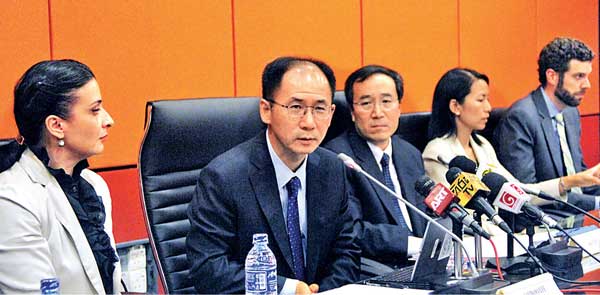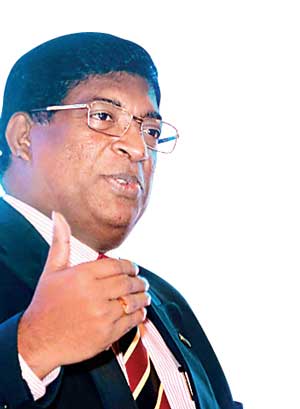26 Sep 2016 - {{hitsCtrl.values.hits}}

The IMF mission Chief Daewoo Lee (second from left) flanked by Eteri Kvintradze (on his right) and Kenneth Kang, Deputy Director for Asia Pacific Department (on his left) along with the other members of the staff team addressing the media at the Central Bank premises after concluding the two-week long first post-programme monitoring review of the Sri Lankan economy’
Pic by Pradeep Dilruckshana
The International Monetary Fund (IMF) last week asked the government to expedite the legislative process pertaining to Value Added Tax (VAT) amendments, and stressed that any delay in doing so could lead to the postponement of the disbursement of the second tranche of the US $ 1.5 billion three-year Extended Fund Facility (EFF) entered into with the government in June.
Making the parting remarks after concluding the first review of Sri Lankan government’s economic programme that is being supported by the EFF, the Chief of the IMF staff team, Jaewoo Lee however said all quantitative targets through end June had been met by the government.
“We want to see the VAT Amendment Bill to be submitted to Parliament. That will enable us to go to our board with good conscience (and say) that progress is (being) made.
If it does not happen in a timely manner, we might have to postpone the (next) review,” Lee told the reporters on Friday.
The disbursement of the US $ 1.5 billion would occur in 7 tranches of approximately US $ 160 million each, followed by semi-annual reviews. The first such disbursement was made in early June.
The EFF programme entered into saw the IMF prescribing a slew of fiscal reforms, the majority of which relating to enhancing government revenue through taxes.
Sri Lanka has one of the lowest tax revenue-to-GDP ratios in the region. Meanwhile Eteri Kvintradze, the IMF Resident Representative for Sri Lanka and the Maldives said that the VAT would become one of the main revenue sources for the government in 2017.
“We expect the VAT to take full effect in 2017 and it will be one of the main revenue sources in the 2017 budget. So, we don’t see VAT as a temporary measure. We see VAT as something that could support Sri Lanka’s revenue capacity,” Kvintradze said.
The IMF’s remarks on the VAT were contrary to the government’s claims that the increase of the VAT to 15 percent was only a temporary measure.
Commenting on additional tax reforms that are expected from the forthcoming budget, Lee wanted the government to revise income tax structure— perhaps in reference to either a higher income tax rate or an expansion of the tax net or both.
“For the 2017 budget, we want the government to implement income tax reforms, which will rebalance the source of tax revenues, towards a larger share of direct tax revenues compared to indirect taxes. That will be a main component of the budget”, he added.
Sri Lanka collects 80 percent of its tax revenue through indirect taxes and 20 percent through direct taxes. The Prime Minister promised to bring this tax revenue mix to 60:40 in November, last year. But later the government did exactly the opposite by raising indirect taxes.
While welcoming the Central Bank’s move to pre-emptively tighten the monetary policy to maintain inflation within the target stipulated by the IMF, the mission Chief asked the Monetary Board to, “remain vigilant in monitoring inflation pressures and stand ready to tighten further should inflation or credit growth continue to rise”.
“The mission welcomes the effective tightening of fiscal and monetary policies that contributed to improving market confidence and easing pressures on external balances,” Lee said in a statement.
Despite the headwinds and widespread uncertainties, Lee forecasted the Sri Lankan economy to grow at least by 5 percent in both 2016 and 2017, much slower than the 6.5 percent target of the government.
“There have been some ups and downs but we still expect the growth rate to be around 5 percent this year and next year,” he remarked.
The mission stayed in the country from September 13 to 23 holding discussions with various Sri Lankan authorities and these discussions will continue in October in Washington D.C. during the annual meetings of the IMF and World Bank.
 The International Monetary Fund (IMF) appears to be hounding Sri Lanka’s Finance Minister in the wake of multiple blunders in attempting to pass the Value Added Tax (VAT) Bill, increasing the taxation rates in recent months.
The International Monetary Fund (IMF) appears to be hounding Sri Lanka’s Finance Minister in the wake of multiple blunders in attempting to pass the Value Added Tax (VAT) Bill, increasing the taxation rates in recent months.
“We have another 55 days for the budget, and as the Finance Minister, I get harassed, by nobody else than the IMF,” Finance Minister Ravi Karunanayake told a recent forum in Colombo.
An IMF mission which was in the country last week said that not legislating the VAT Bill soon would threaten the continuation of the 3-year US$ 1.5 billion Extended Fund Facility which started this June and which Sri Lanka is depending on to correct its balance of payments issues.
The attempt to legislate the VAT rate increase through the Cabinet this June had resulted in the Joint Opposition filing a fundamental rights petition at the Supreme Court, which ruled that the VAT amendments were not constitutional, since they were not passed through parliament.
Karunanayake had then drafted another VAT Bill last month, which got cabinet approval this month to go to parliament. However, the Joint Opposition pointed out that the legislation was published through Government Gazette earlier than it was approved by the cabinet, which was also illegal.
The government had planned to increase VAT rates from 11 percent to 15 percent in order to shore up the budget deficit which had spun out of control to 7.4 percent of gross domestic product in 2015 due to unsustainable public sector wage increases, compared to a projected deficit of 4.4 percent.
The IMF funding, as well as further funding from other multilateral organizations such as the Asian Development Bank, are dependent on massive fiscal policy reforms the government has to fulfil within certain periods of time.
Karunanayake has recently been seen visiting all parts of the country collecting proposals for the upcoming budget from the people, and he was quoted saying that the new budget would be revolutionary.
However, past trends may be witnessed again, judging from the promises made by Karunanayake at recent forum to large businesses that protectionism and concessions would continue, despite the lack of fiscal space to enact them.
Sri Lankan budgets since independence had focused on giving election goodies instead of the required fiscal policy tightening, which, together with loose monetary policy had led the country to short cycles of boom and bust.
The IMF however noted that recent months had seen greater fiscal and monetary discipline in the country. This is possibly a side-effect of the appointment of Dr. Indrajit Coomaraswamy as the Central Bank Governor, who has acted pre-emptively to weigh down threats.
Meanwhile, the IMF too appeared to have acted pre-emptively, setting an appointment one hour earlier than they intended to show up, probably in order to account for the always late Karunanayake, who in this instance had arrived on time.
Karunanayake said that he had contemplated blowing off the meeting with the late IMF delegation, but decided on the contrary.
“I’m sorry I was late. Working to time is essential. They (IMF) were supposed to come at 10.30 in order to make me come on time, but they came at 11.15. So either I had to come late here or tell the IMF to go home,” he said. (CW)
26 Nov 2024 51 minute ago
26 Nov 2024 2 hours ago
26 Nov 2024 3 hours ago
26 Nov 2024 4 hours ago
26 Nov 2024 4 hours ago